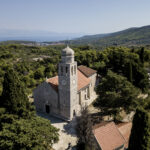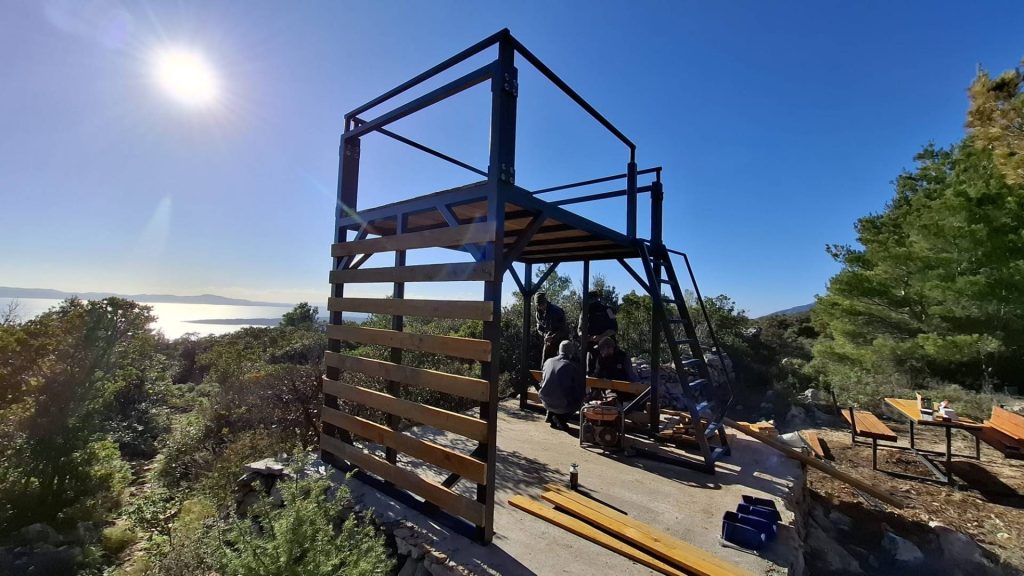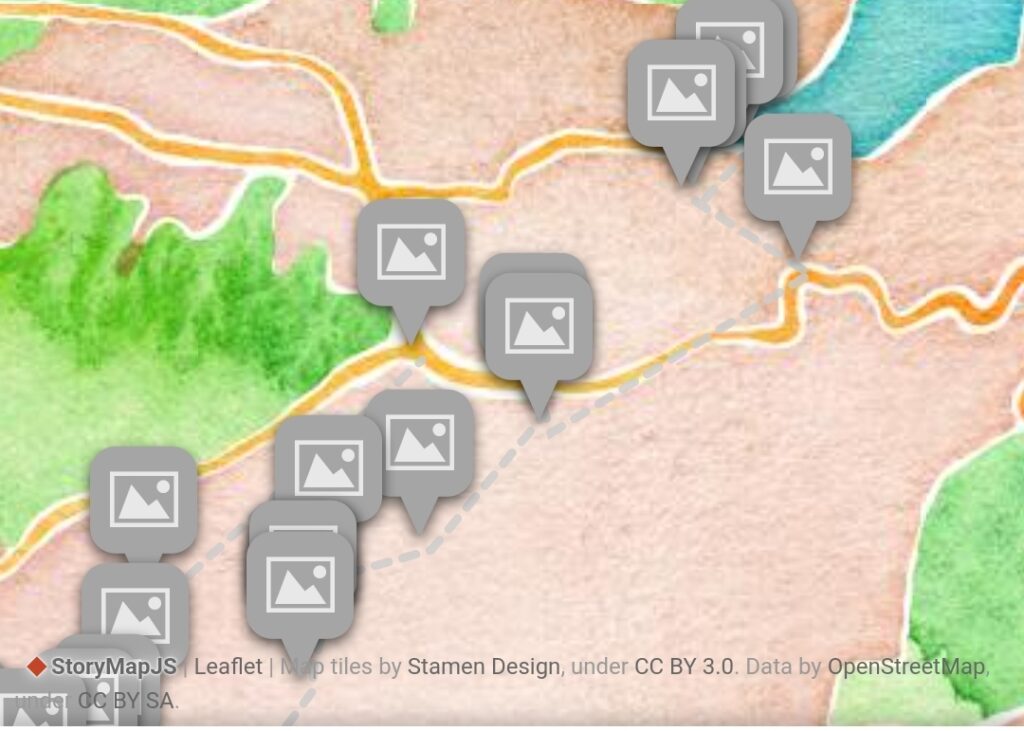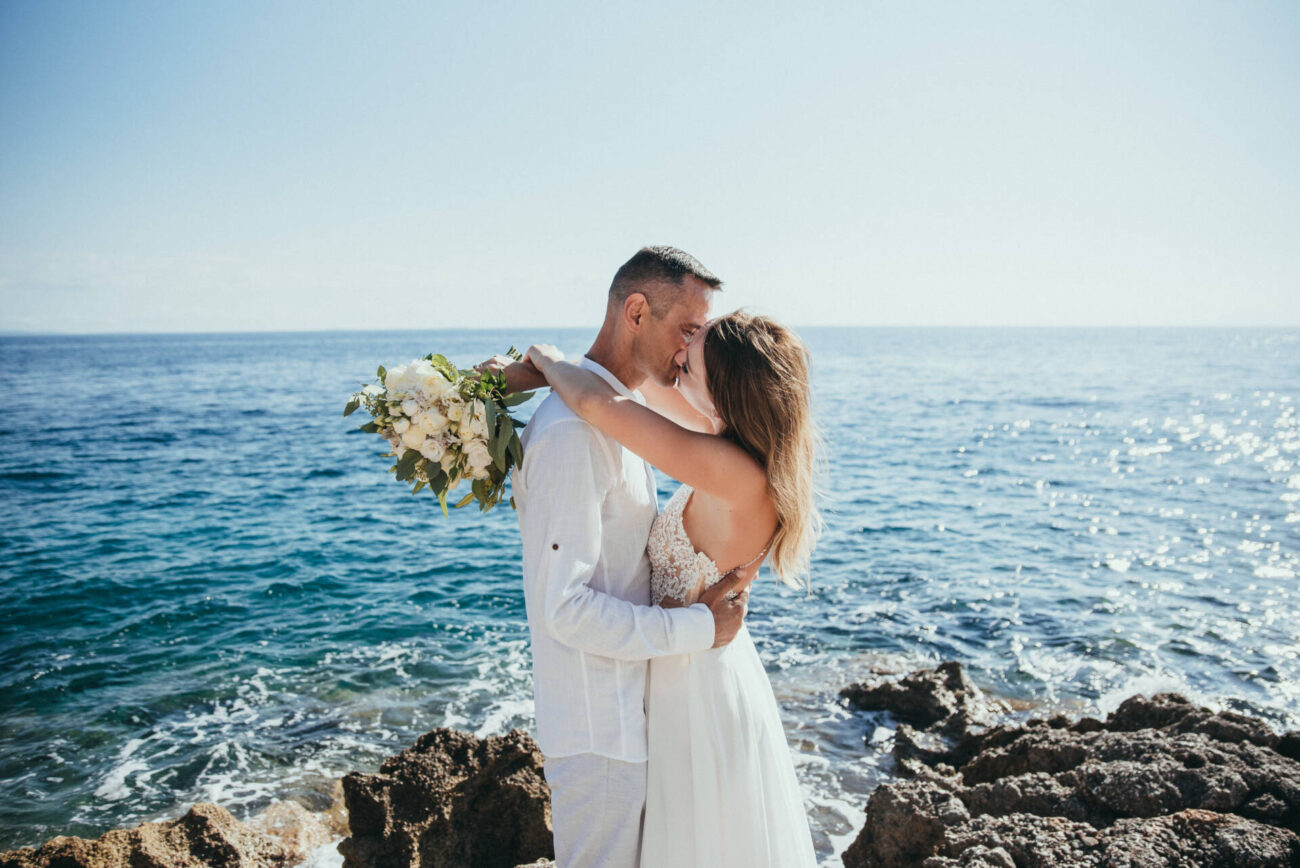
Weddings on Hvar Island
Hvar Island, one of the most beautiful islands in the world, is a particularly magical venue for weddings. It is perfect for celebrating one of the most important events in your life.
The abundance of locations by the sea, in the countryside, on the nearby islets, with luxurious villas and holiday homes, together with the choice of traditional or modern restaurants, add up to a rich combination of diverse, unique conditions for your special day. All you have to do is choose your special venue, which will certainly provide you with happy memories for a long time to come.
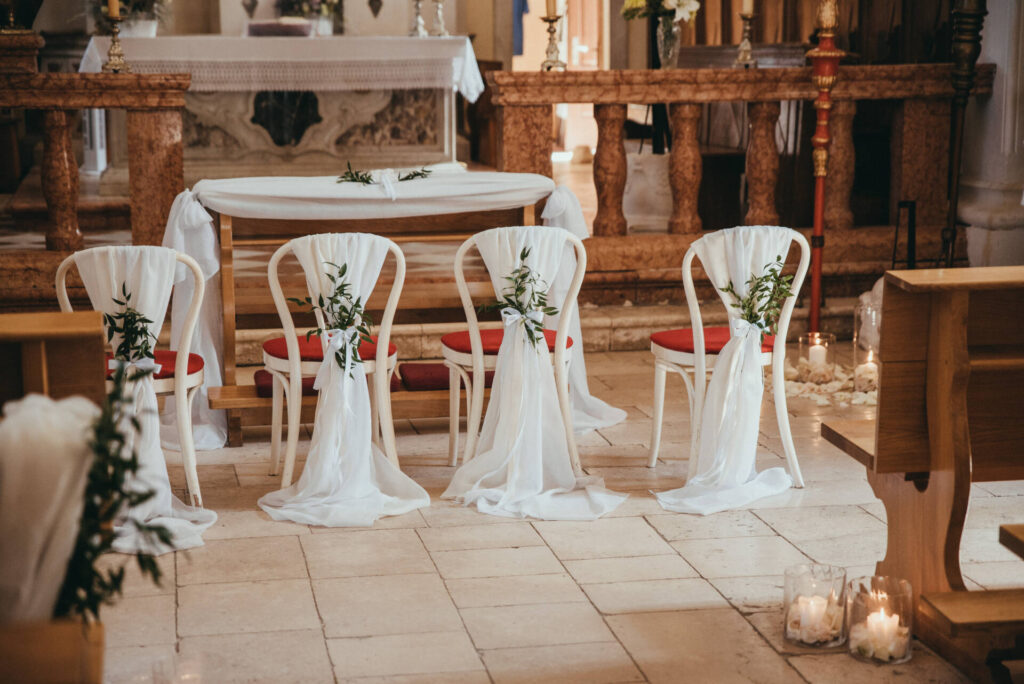
Of course, if you want to sail into marriage in Croatia, there are administrative procedures to be followed. We recommend that you hire a local professional wedding organiser to help you understand the procedures and to make sure all the necessary requirements are fulfilled.
These are the basic rules governing weddings in Croatia:
Eligibility
* You have to be over 18 years of age (although in certain cases the Courts may allow a person over 16 to marry.
* You have to be of sound mind, capable of rational decision-making.
* You have to be free to marry, i.e. not married to someone else.
* Marriage is not allowed between close blood relations.
* Same-sex marriages are not allowed (although same-sex couples can register a life-long partnership).
You can choose between a civil ceremony and a religious wedding.
The Civil Ceremony
The first steps:
- decide where and when you want the ceremony to take place
- collect together the necessary documents (see below)
- notify the Registrar in the place of your choice of your intention to marry
- decide on which surname will be used
- choose two witnesses for the wedding.
Notification for a civil wedding before a Registrar must given in person by both parties in advance, between 30 and 45 days prior to the chosen date. The Registry Office for Hvar is in Hvar Town, where the contact number is +385 (0)21 741 936, e-mail address is: Jasna.Plenkovic@dalmacija.hr.
Note: if you do not speak Croatian, you will need to bring an official court translator with you to the Registrar. (The translator has to speak any language you understand, not necessarily your native tongue.)
Documents needed
If one of the couple is Croatian, the following documents have to be produced for that person:
- birth certificate (less than three months old)
- confirmation of eligibility to marry
- proof of identity
- proof of citizenship
If one or both parties are foreigners, the following documents are needed:
- An original of your birth certificate issued in the country of your birth in accordance with international treaties and conventions. This has to be apostilled and translated into Croatian by an official translator.
- A certificate that you are free to marry according to international treaties and conventions. This has to be translated into Croatian by an official translator. (The embassy of your country of origin may help with this, as requirements may vary from country to country.)
- A certificate confirming that there are no obstacles to the marriage in the Republic of Croatia, and that the marriage will be recognized in the country of your origin, translated into Croatian. (Usually the certificate that you are not already married in the country of your origin is enough proof.)
- A document that proves your identity (ID card or passport).
- A document that proves your citizenship (eg your passport)
In addition, you’ll also need to provide:
- Copies of the passports or ID documents for your witnesses.
- Payment of the marriage license fee. The fee covers compilation of the minutes of the marriage application and the act of marrying before the magistrate, also the marriage certificate.
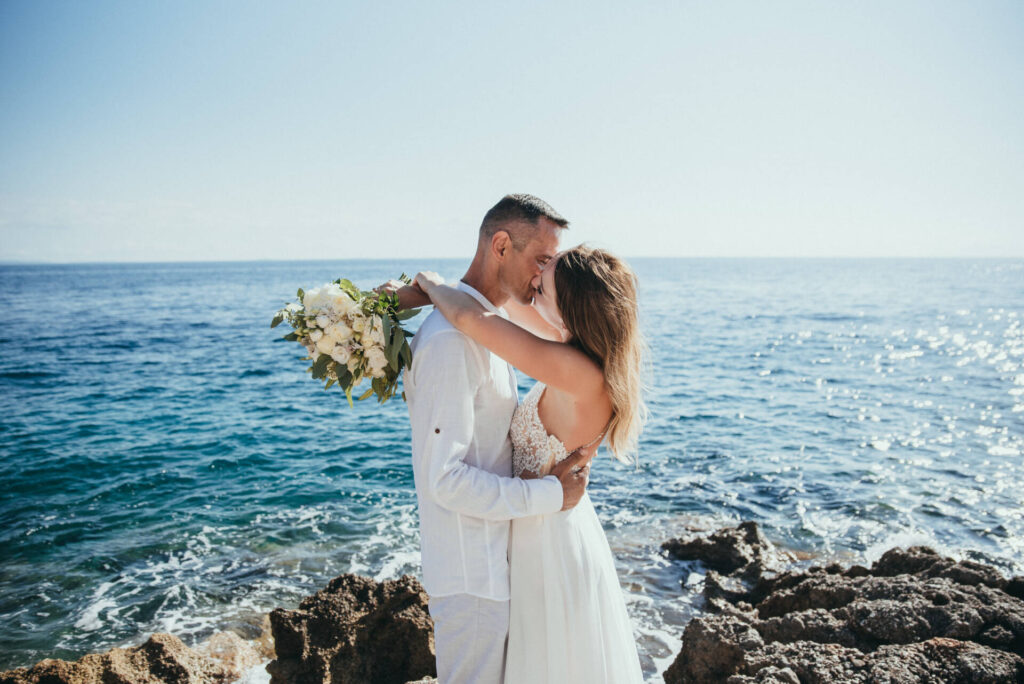
A religious wedding
An official spiritual representative (eg priest, imam or rabbi) of any religion which is recognized in the Republic of Croatia can perform wedding ceremonies in the country.
To validate the ceremony, the Registrar has to issue a certificate confirming that the conditions for a legal marriage have been met. The certificate is issued on the basis of the same documents as are required for a civil ceremony (see above).
Note: the certificate is valid for a period of three months after the date of issue. A religious wedding carried out without a valid certificate from the Registrar does not have the same legal status as a civil wedding.
Once the marriage is completed, the marriage certificate which makes the union official is issued by the Registrar without further charge.
A Catholic Church Wedding
Croatia is a predominantly Catholic country, and Hvar is home to many very beautiful Catholic churches. There are no other denominations represented on the island. If one or both are Catholics, many couples choose to have their wedding in one of the island’s Catholic churches. This is done by arrangement with the priest in the chosen parish. There are several conditions to fulfil:
Advice for couples thinking of having a Catholic Church wedding on Hvar.
These are the general conditions which should be fulfilled:
- Make sure you know the laws of your own country in relation to a religious wedding: in particular, do you also need a civil marriage ceremony before or after the church wedding?
- Go to your own Catholic parish priest (either of the bride or bridegroom), tell him you wish to marry, that you want the ceremony to take place abroad, and say exactly where you want the ceremony to be.
- Your priest will help you to collect together the necessary documentation from your own country (see above).
- You will need to go through the pre-marital counselling process. Your priest will conduct this himself, or guide you to Pre-Cana classes you can attend. Make sure you obtain the certificate that you have gone through the whole process, as you will need to include it in your wedding application.
- If you want your wedding to be conducted in your native language or any other foreign language, you will be responsible for engaging a priest who can perform the ceremony in that language.
- If you want to choose a priest from your own country for the ceremony, whether he is your own priest, a friend who is a priest, or a priest identified by an agency, he must bring with him positive proof that he is a bona fide priest (assuming that he is not known to the local parish priest).
- If you choose your own priest, it is important that you tell the priest who is preparing you for marriage who he is, as he must have permission from your Bishop to do so, and the Bishop’s name and the document certifying his permission must be included in your documentation.
- The priest who helps you to gather together your necessary documents will certainly be aware that all the documents needed for a wedding must be sent to your Bishop. The Bishop’s officials are tasked with checking that your documents are valid, issuing wedding permits, resolving issues relating to hindrance or prevention of the nuptials (if these exist), and then sending the documents to the Bishop of Hvar BISKUPSKI ORDINARIJAT HVAR, Trg sv. Stjepana 26, 21450 HVAR). The Bishop of Hvar will check the documents and pass them on to the parish priest for registration in the parish records.
- If your marriage documents are in the language of your country, they must be translated into Croatian. As official forms vary, and different rules apply to their use in different places, ask your priest what you have to do with the documents you send to Croatia (where you have to sign them, which sections you have to fill in after the marriage, who you have to send the notice of marriage to, and so on). Then you should meet the parish priest on Hvar a few days in advance of your wedding, and inform him of what he has to do in this administrative sphere. If you have no common language, you will need to take an interpreter with you.
- The Catholic Rite of Marriage can be celebrated in two ways: one with a full Mass, or the other with the Liturgy of the Word only (please ask the priest who is preparing you about this). If one of the couple is not Catholic, the latter format is recommended. In either case, the religious rites cannot be formulated arbitrarily, but have to unfold according to the liturgical rules of the Church. Within the model you choose, everything will be done by agreement with the parish priest on Hvar and any other priest who will be in attendance at your wedding, in accordance with the established rites.
- If you are planning to marry during the summer months, be aware of the required dress code, especially for the bride and all females attending the wedding. No-one may enter the church in inappropriate clothing. Mini-skirts, for instance, are not allowed. If anyone wishes to wear clothing which is open and revealing, they must have a shawl or scarf and cover themselves while in the church.
- You can choose whatever music you want, which is appropriate for a church. Arrangements can be made in advance with local singers and organists, or you can engage your own musicians, at your expense.
- If the ceremony is to be photographed or filmed by one or more photographers who are not from Hvar, please ask them to see the parish priest half an hour before the ceremony at the very latest, to receive instructions on where they can and cannot stand, and how they can move about during the service. They must be clear that they should move around as little as possible, and at no time should they intrude in the space between the altar and the seats for the bride and groom.
- Decorations: it is customary to decorate the edges of the pews with ribbons. It is forbidden to decorate the pews with flowers, or to throw flowers or petals inside the church; if you are having a Mass, flower arrangements must not be placed on the altar. Flowers are allowed in front of the altar, provided they do not impede movement around it, also near the seats for the bride and groom.
- If guests wish to throw rice or confetti over the couple as they emerge from the church, you are asked to ensure that this is kept to a minimum, and that the churchyard will be cleared immediately after the ceremony.
Wedding organisers:
Some of the companies which can organise weddings on Hvar: VillasHvar; Something Blue; Promessi, weddingseventscroatia; Untamed Adriatic; Hvartours
Accommodation and celebrations
You can view a selection of holiday accommodation in the Jelsa region on this link
Jelsa and its surrounding areas offer a wealth of superb restaurants in beautiful, romantic surroundings, whether offering sea views, spectacular sunsets, or beautifully arranged gardens.
In the normal way, (when free of Covid-19 restrictions) the Dalmatian custom is to celebrate with an evening meal and dancing through to the early hours, most often in one of Jelsa’s hotels.
Rules for entering into marriage (in Croatian:) https://gov.hr/hr/sklapanje-braka/678
Photographs: Kate Ševo











